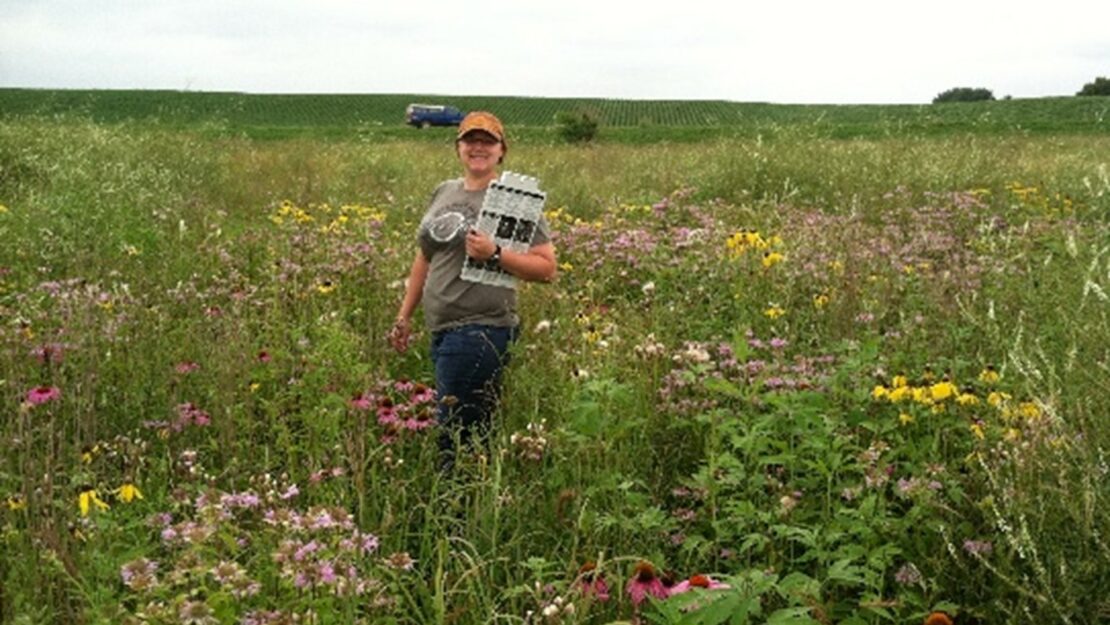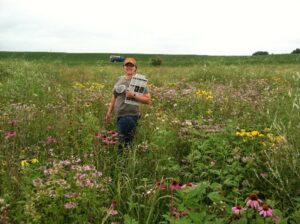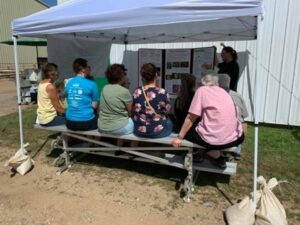Uncovering Conservation Careers: Conservation Technician

By Adriene Matthews, Agriculture and Outreach Specialist Individual Placement Member / AmeriCorps Member placed at Cottonwood SWCD.
There are several different types of jobs in conservation in America. Wildlife and marine biologists, wildlife technicians, environmental scientists, and foresters, just to name a few. This article will highlight the jobs in conservation that may be overlooked, or people have never heard of before, me included.
Hi, my name is Adriene Matthews, and I am an agriculture outreach specialist for Conservation Corp Minnesota & Iowa in the town of Windom, in Southwest Minnesota. I have had the wonderful opportunity to work alongside so many different organizations and agencies, from Minnesota Pollution Control Agency (MPCA), Department of Natural Resources (DNR), Natural Resources Conservation Service (NRCS), Soil and Water Conservation Districts (SWCD), and Minnesota Department of Agriculture (MDA). I was able to learn about all the different ways these organizations are helping with conservation of land, air and water, in Minnesota.
Becky Buchholz is a long-time conservationist and is still learning new things every day. She went down a bit of a long road to get where she is now, but that path helped to shape her into one of the most versatile and knowledgeable conservation technicians I have ever met.

Becky originally went to college for Veterinary sciences, but she realized freshman year that she had not gotten over her fear of dogs. She then changed her degree path and remembered how she enjoyed an ecology course she took in high school and got her bachelor’s in field biology at University of Wisconsin River Falls. Once in her senior year, Becky felt like there was still a lot left for her to learn about and went on to get her Master of Science in Aquatic Ecology with an emphasis in Natural Resources at University of Nebraska-Lincoln. After college she worked at the National Park Service at St. Croix Falls in Wisconsin, the Metropolitan Mosquito Control District, and taught kids at a natural resources specialty school in Eagle River, Wisconsin.
After being away from Minnesota for so long Becky wanted to come back and started to apply for conservation jobs. She was offered two jobs, one in Oklahoma and one in Southwest Minnesota. Wanting to be closer to home she took the Watonwan Watershed technician position at the Cottonwood SWCD.
When Becky started at Cottonwood SWCD she ended up taking on a lot of roles. She began to work with conservation easements programs; Reinvest in Minnesota (RIM) Conservation Reserve Program (CRP), became a feedlot officer and septic inspector, and currently Becky is learning about the Wetland Conservation Act.

After working as a district technician and wearing so many hats for over a decade Becky enjoys working with landowners to enroll their fields in RIM. Being able to get out of the office and walk with a landowner and identify the native plants in their field, is something that Becky truly loves about her job. Another thing that she loves about her job, is getting the opportunity to talk to landowners and explain all the scientific jargon that a lot of researchers and scientists write about the best management practices that could be used in their operations. Summarizing and explaining it in a way that anyone can understand allows Becky to speak with someone who is interested in learning about better management practices, conservation easement programs, septic inspections, and so on, while also not overwhelming them with too much scientific mumbo-jumbo. While many of us in conservation know what needs to be done to protect our earth, and to make it sustainable for future generations, it isn’t always feasible for everyone to do those things. CBS reports that 60% of farmers in Minnesota do not own the land that they farm. While a farmer may want to enroll in a conservation program because it would be better for the land, the owner of the land may not want to do that. However, Becky’s job is still so important to conservation, because that same farmer she spoke with a few years prior about RIM, may own some land currently and come back into the office to talk with her about enrolling in that program. Fabienne Fredrickson once said ‘The day you plant the seed is not the day you eat the fruit.’ As much as we want to see change happen instantly, there are many times in which we as conservationists have the amazing possibility where we can provide everyone with the access to conservation knowledge to make educated decisions regarding which conservation practices best applies to them. This is something that Becky has learned and takes with her every time she speaks with someone.

